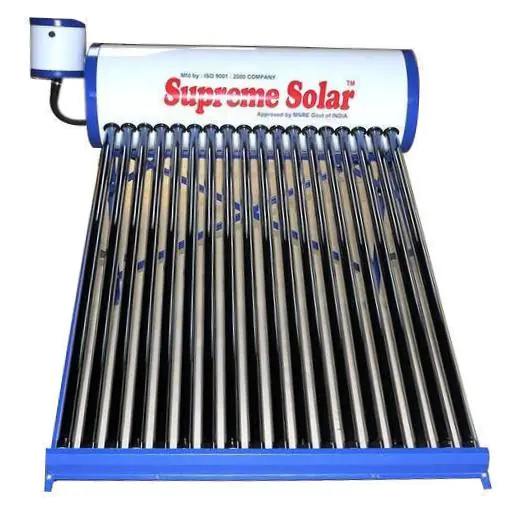Buy 150 Liter Solar Water Heater - Best Price
Introduction
Solar energy has revolutionized the way we think about heating water. With increasing concerns about energy efficiency and environmental sustainability, more and more people are turning to solar water heaters as a greener alternative. In this article, we will explore the advantages and features of a 150-liter solar water heater. From its efficiency to cost savings, we will delve into the details to help you understand why a 150-liter solar water heater is a smart choice for your home.

Understanding the 150-Liter Solar Water Heater
A 150-liter solar water heater is a system designed to utilize solar energy to heat water for various purposes. It consists of a collector, storage tank, circulation system, and controls. The collector, usually mounted on the roof, absorbs sunlight and transfers the heat to the water stored in the tank. The heated water is then circulated to the desired outlets whenever hot water is required.
Benefits of a 150-Liter Solar Water Heater
-
Energy Efficiency: A 150-liter solar water heater relies on renewable solar energy, making it an energy-efficient option. By harnessing the power of the sun, these heaters reduce dependence on fossil fuels and lower greenhouse gas emissions.
-
Cost Savings: Solar water heaters provide significant cost savings in the long run. While the initial installation cost may be higher compared to traditional water heaters, the absence of monthly utility bills for heating water results in substantial savings over time.
-
Environmentally Friendly: Choosing a 150-liter solar water heater demonstrates your commitment to environmental conservation. By utilizing clean energy, you contribute to reducing carbon footprints and minimizing the depletion of natural resources.
-
Reliable and Independent: Solar water heaters operate independently of the electrical grid, making them a reliable source of hot water even during power outages. This ensures that you always have access to hot water regardless of the prevailing conditions.
-
Long Lifespan: High-quality 150-liter solar water heaters are built to last, providing you with hot water for many years. With proper maintenance, these systems can have a lifespan of 20 years or more.
-
Versatile Applications: A 150-liter solar water heater is suitable for residential and commercial use. Whether you need hot water for bathing, laundry, or dishwashing, these heaters can fulfill your daily requirements.
Price List for 150L Water Heater
| Solar Water Heater Model | Selling Price | Price/Liter |
| ETC 150 Liter SWH | Rs.22,500 | Rs.150 |
| FPC 150 Liter SWH | Rs.37,500 | Rs.250 |
| FPC Px. 150 Liter SWH | Rs.45,000 | Rs.300 |
| FPC HE 150 Liter SWH | Rs.45,000 | Rs.300 |
| FPC Px. HE 150 Liter SWH | Rs.52,500 | Rs.350 |
Installation and Maintenance
Installing a 150-liter solar water heater requires professional expertise to ensure optimal performance and safety. Here are the key steps involved in the installation process:
-
Site Assessment: A thorough assessment of the site is crucial to determine the best location for the solar collector, considering factors such as sun exposure and shading.
-
Collector Installation: The collector is mounted on the roof or a suitable location where it receives maximum sunlight. Proper orientation and angle adjustment are essential for optimal energy absorption.
-
Tank and Circulation System: The storage tank and circulation system are installed indoors or in a protected area. The tank should be properly insulated to minimize heat loss.
-
Plumbing Connections: The plumbing connections are made to ensure the flow of hot water from the solar water heater to the desired outlets in the building.
-
Controls and Safety Measures: The controls and safety features, such as temperature sensors and pressure relief valves, are installed to regulate and protect the system.
Maintenance of a 150-liter solar water heater typically involves periodic inspection, cleaning, and maintenance of the collector, tank, and circulation system. It's important to follow the manufacturer's guidelines and schedule regular maintenance checks to ensure optimal performance.
